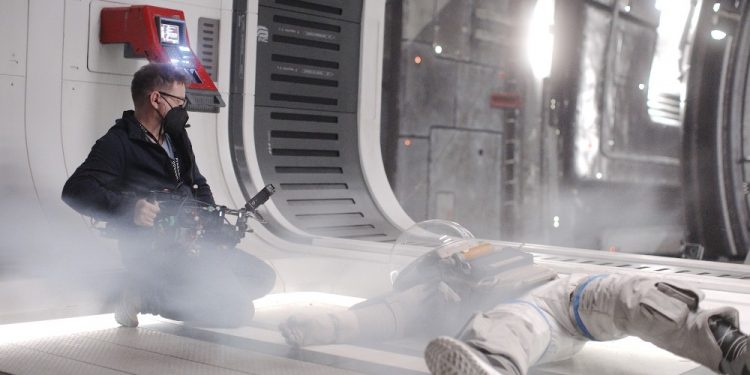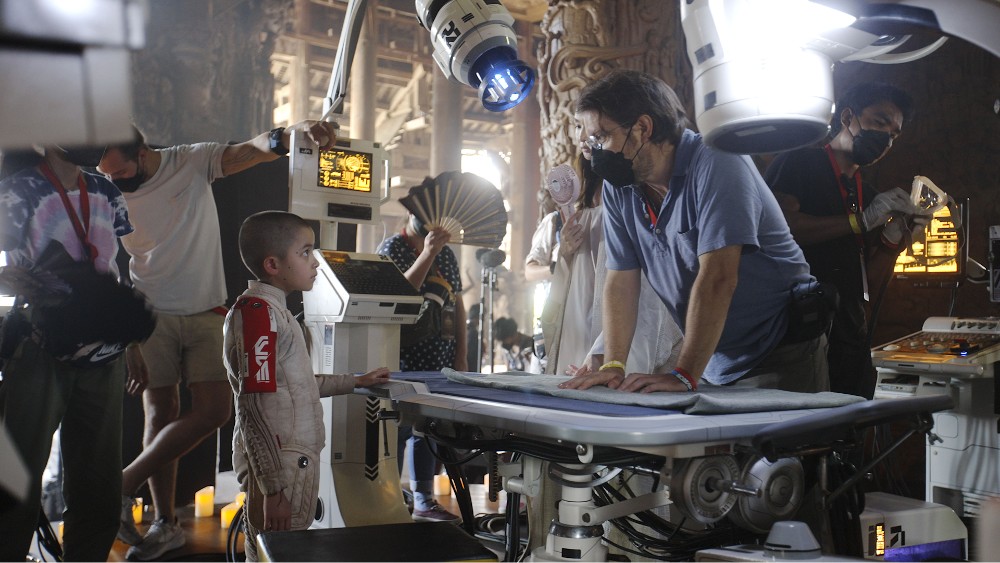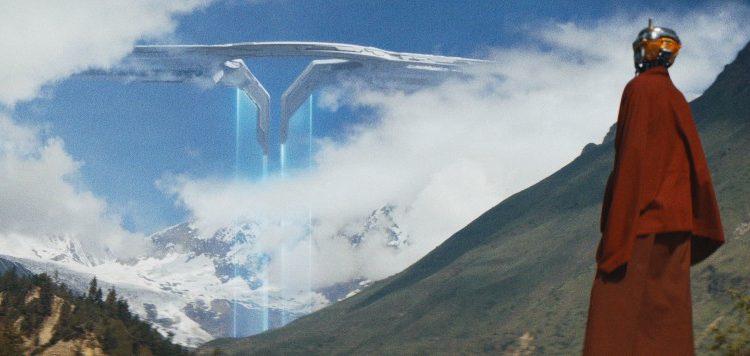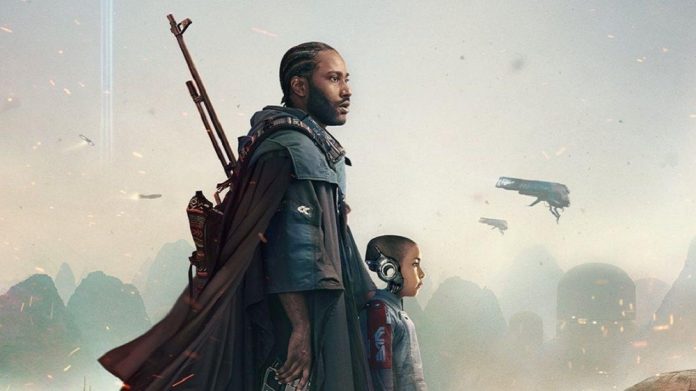A futuristic war between humans and A.I. might not seem that far-fetched these days, especially given everything that’s going on in the industry right now, but the inevitable clash between humans and robots has been a staple of science fiction for decades, going back to Isaac Asimov‘s I, Robot books and the early sci-fi of the 1950s.
On the big screen, James Cameron‘s Terminator franchise has become an evocative touchstone for younger sci-fi enthusiasts, who will likely spark to the new sci-fi movie The Creator, which hails from Rogue One and Godzilla director Gareth Edwards.
John David Washington (Tenet) stars as Sgt. Joshua Taylor, an American military man living undercover in a robotic community in Asia with his true love, Maya (Gemma Chan). Taylor’s superiors are hunting “Nirmata,” the mythical figure responsible for creating the A.I. that might be used to wipe out humanity, and Maya is killed in an ensuing attack. Five years later, Taylor is sent back to Asia to find this creation and prevent it from destroying humanity’s one hope to prevail. Along his journey, he meets a young synthetic (Madeleine Yuna Voyles) whom he names “Alphie,” and together they must stay one step ahead of the U.S. military (led by Allison Janney), which is hot on their heels.
Above the Line spoke briefly with Gareth Edwards over Zoom about a few of the things that help The Creator stand apart from other original sci-fi films, including Denis Villeneuve‘s Dune, even though the two films share several Oscar-winning crew members, including composer Hans Zimmer, cinematographer Greig Fraser, and editor Joe Walker.

Above the Line: You must have known you were taking a gamble in making an original science fiction movie set in the world of A.I., not to mention releasing it right now. Can you talk about that decision?
Gareth Edwards: Actually, in the summer, when there was word there may be a strike coming, we went to Disney and [said], ‘The film’s coming out at the end of September. Should we keep doing that? Like, what should we do?’ They brought up on the wall — they have these massive LED screens — and they showed us every movie that’s coming out through the summer and the fall. They were like, ‘Look at all these films. They’re all sequels, franchises, IP, or based on a book. This is the only original blockbuster-y thing there is. What are we doing if we move this now?’
When I was a kid growing up, every week, there was an original sci-fi or fantasy film or an amazing movie that was out. I really felt like I wanted to see something like this back in the cinema. It’s just like you might go down to the grocery store and throw loads of things in your trolley. I was throwing all my favorite Blu-rays in my trolley, and then going to the kitchen and stirring the pot and trying to pull out this… it was very much based on all the films I grew up loving, but hopefully in such a way that it’s got an original voice of its own.

ATL: One of the things that really sticks out to me is the whole concept of “Nirmata.” I’m not sure if that’s a real thing within Eastern religions, but can you talk about where that idea came from and why you wanted to incorporate it into this war between humans and robots?
Edwards: “Nirmata” is actually a Nepalese word for “The Creator.” The creator is essentially this person — in our movie, in our world — that is kind of the Oppenheimer of AI, and he’s doing all these amazing breakthroughs. Basically, the West, who have banned A.I., want to find and essentially kill the Creator, so the [Creator is] kind of like the Osama bin Laden of this world. But from the other perspective, from A.I.’s point of view, the [Creator is] kind of God, and it’ll do anything to protect them. It felt like a really interesting setup that one person’s public enemy number one is another person’s savior. That was the beginning of it.
I don’t want to spoil it for anyone, but what the Creator has made is this child, who is the first A.I. that is going to supersede humans. Everyone is after this child and wants to kill it, and basically, John David’s character can win the war [and] save humanity… all [he has] to do is kill a six-year-old kid. It’s that dilemma that got me excited. I [thought], “I’d really like to watch a film like that and see where it goes.”
ATL: I know The Creator wasn’t the original title, so when and why did you decide to change it?
Edwards: The original title that we worked with was True Love. I wrote it as a film called True Love, and we even shot it, and the DoP has a tattoo saying “True Love” with the logo on it. When we started to do some research, everyone’s assumptions [about] that title [were] that it [was] a rom-com or something else. When you watch the movie, and you come out the other end of it, I think that title makes total sense, but it didn’t get people to understand what the film is really about. We tried a lot of different titles, and “The Creator” was the one that got the most response from people. “Ah, I would go see that,” so, whatever gets people in the cinema, really.

ATL: Obviously, John David is great and Madeleine’s an amazing find, but I was most interested in your decision to cast Allison Janney, who was an interesting choice because I’m not sure she’s ever played a military role like this. What made you think of her for it?
Edwards: She said the same thing — that she’d never really been offered or had the chance to do something like this, so she was really excited about it. I think one of the best [examples] of a great female role in science fiction is Ripley [Sigourney Weaver] from Alien and Aliens. One of the interesting facts about that is they wrote that originally for a guy, so that was supposed to be a man. At the last minute, they changed it to a woman. I think it made it a very strong role because no one was pandering to gender or anything. They just wrote what was a great character. We tried to play the same trick. We wrote this movie. I’m a guy and the writer’s a guy, so we just wrote them as guys, knowing that, [in] the end, we’re going to pick the most interesting people and turn them into women [if we have to].
The character that Allison Janney plays is super-interesting, [but] we [had] to flip her and make her female. I love the idea of casting someone who normally gets [very different] scripts. I wanted it to feel like there’d been a mix-up — like, Steven Seagal, you normally send that script to him. It’s like there had been a mix-up, and it actually had gone to the [person] who normally would play someone’s mom in a movie. We were looking at those sorts of actresses, and Allison Janney is top drawer, and I didn’t think she’d want to do it, basically. She read the script, she was very moved by it, and [she] ended up coming to the middle of nowhere and shooting in the jungle. It was kind of crazy, but she was amazing.

ATL: I watched the movie without knowing who your below-the-line collaborators were, so when I saw that cinematographer Greig Fraser was involved, that Hans Zimmer did the music, and that Joe Walker served as one of the editors, I was impressed. How did you get all those guys to work on The Creator in between the Dune movies?
Edwards: I couldn’t fully wrestle them away from Dune. We knew that was coming when we were making this film. So Greig and Joe were like, ‘Look, if Dune Two happens…’ — they didn’t know, at the time, what was gonna happen — ‘If it happens, then we’re gonna have to go do that.’ It was like, ‘Cool, totally get it,’ and so we kept going.
At some point, they won the Oscar, both of them, and we [began] to look at other options, and I got very, very lucky [with] Hank Corwin and Scott Morris. Hank’s one of my all-time heroes of editing. If you asked me what the two best-edited films [are] in the history of cinema? I can’t answer that question, because I’m torn between JFK and The Tree of Life. Hank was the editor on both of those, so that was a dream come true to work with him.
Joe knew Hans from a lot of other movies, and I thought we’d never get Hans Zimmer. It was gonna be impossible, but Joe was like, ‘No, no, he’s a friend. Of course, he’ll do it,’ and I ended up in this very surreal conversation with Hans Zimmer, where I was in the middle of Thailand in the jungle, and I had to quickly Zoom him whilst we were supposed to be visiting the military to get permission to use their helicopters in our scenes.
I only had 30 minutes to talk to him, and he started telling these amazing anecdotes about Terrence Malick and Chris Nolan. I had to stop him and say, ‘I’ve gotta go,’ and I felt terrible. It was the conversation I’d waited all my life for, and I had to cut him off; it was horrific. I sent him a little short film we had done, and he said, ‘I loved it,’ and ended up doing [the film].
ATL: When Dune: Part Two moved to 2024, I was hoping Disney might move The Creator into that slot and grab all of the IMAX screens it had lined up…
Edwards: I don’t think it works like that.
Disney and 20th Century Studios will release The Creator in theaters nationwide, including IMAX screens, on Friday, Sept. 29, with previews starting on Thursday night.



